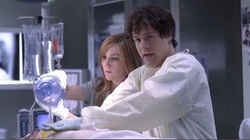
Various studies of CPR on television medical dramas have 67% to 77% of patients making a full recovery after CPR. The true long term survival numbers in US hospitals is around 14%. Perhaps more significantly patients in both medical dramas, and even more often other action shows, show little impact from the procedure other than being slightly dazed and coughing. In reality CPR almost always involves cracked ribs, internal bleeding, and long recoveries and often involves serious neurological damage and often extended mechanical life support.
It is easy to dismiss the success of TV CPR as just good drama but it has real life impacts, just like the bad technique that accompanies it. In surveys the general public indicates that they believe CPR works 60% to 80% of the time and show little awareness of the impact on patients.
"If CPR were a benign and risk-free procedure that offered the hope of long-term survival in the face of otherwise certain death, few people would ever choose to withhold resuscitation," said Dr. James Tulsky, co-director of the program in medical ethics at Duke and co-author of a study of CPR on TV. "Controversy surrounds the use of CPR precisely because it can lead to prolonged suffering, severe neurological damage, or an undignified death." That isn't what people see on TV.
Families are often asked to make choices about resuscitation in the middle of a crisis and their choices may often be influenced by the false images of CPR they experience in pop culture. Without the true facts or contrary guidance from a patient's advanced health care directive, they may believe CPR is the right choice in every case.
"In hospitals across the country, patients and physicians struggle with end-of-life decisions that involve whether or not to attempt CPR and other life-sustaining measures," said Dr. Susan Diem, a researcher at the Durham VA Medical Center. "In subtle but powerful ways, the misrepresentation of CPR on television shows undermines trust in scientific data. Because they appear realistic in many respects, these shows blur the line between fact and fiction."
We believe it is important that clients and their families have good information to make wise choices about care both while planning and while make choices. To learn more about how to make sure good choices are made for your care, contact us for a free consultation at [email protected] or (206) 459-1908.
 RSS Feed
RSS Feed